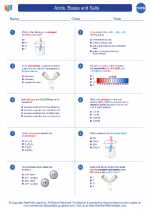Adrenocorticotropic Hormone (ACTH)
Adrenocorticotropic hormone (ACTH), also known as corticotropin, is a hormone produced by the anterior pituitary gland in the brain. It plays a crucial role in the regulation of the body's stress response, as well as in the functioning of the adrenal glands.
Functions of ACTH:
- Stimulation of Cortisol Production: ACTH stimulates the adrenal cortex to produce and release cortisol, a hormone that helps the body respond to stress.
- Regulation of Adrenal Function: ACTH is essential for the normal growth and development of the adrenal cortex, and it helps regulate the production of other hormones such as aldosterone and androgens.
- Stress Response: When the body perceives stress, the hypothalamus in the brain signals the pituitary gland to release ACTH, which in turn stimulates the adrenal glands to produce cortisol. This helps the body cope with the stressor.
- Regulation of Immune Function: ACTH has been shown to have immunomodulatory effects, influencing the body's immune response.
Regulation of ACTH Secretion:
The secretion of ACTH is regulated by a complex feedback system involving the hypothalamus, the pituitary gland, and the adrenal glands. The hypothalamus releases corticotropin-releasing hormone (CRH), which stimulates the pituitary gland to produce and release ACTH. ACTH then stimulates the adrenal cortex to produce cortisol. When cortisol levels in the blood are high, they exert negative feedback on the pituitary and hypothalamus, reducing the production of CRH and ACTH, thereby regulating the levels of cortisol in the blood.
ACTH Imbalance:
Imbalances in ACTH levels can lead to various health issues. For example, excessive ACTH production can result in conditions such as Cushing's syndrome, characterized by high levels of cortisol in the blood, while insufficient ACTH production can lead to conditions like Addison's disease, where the adrenal glands do not produce enough cortisol.
Study Guide:
To understand the topic of adrenocorticotropic hormone (ACTH) comprehensively, consider the following study guide:
- Learn the structure and function of the adrenal glands, including the different layers of the adrenal cortex and the hormones they produce.
- Understand the role of the hypothalamus and pituitary gland in regulating ACTH secretion, and the feedback mechanisms involved in this regulation.
- Explore the physiological effects of cortisol on the body, including its role in metabolism, immune function, and stress response.
- Study the causes, symptoms, and treatment options for conditions related to ACTH imbalance, such as Cushing's syndrome and Addison's disease.
- Review the clinical tests used to measure ACTH levels and diagnose related disorders.
By mastering these aspects of ACTH, you will have a comprehensive understanding of its function, regulation, and clinical relevance.
.◂Chemistry Worksheets and Study Guides High School. Acids, Bases and Salts

 Worksheet/Answer key
Worksheet/Answer key
 Worksheet/Answer key
Worksheet/Answer key
 Vocabulary/Answer key
Vocabulary/Answer key
